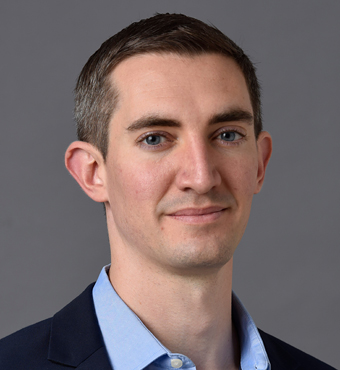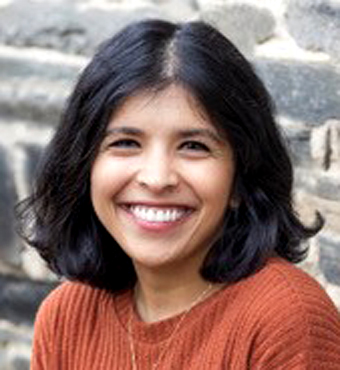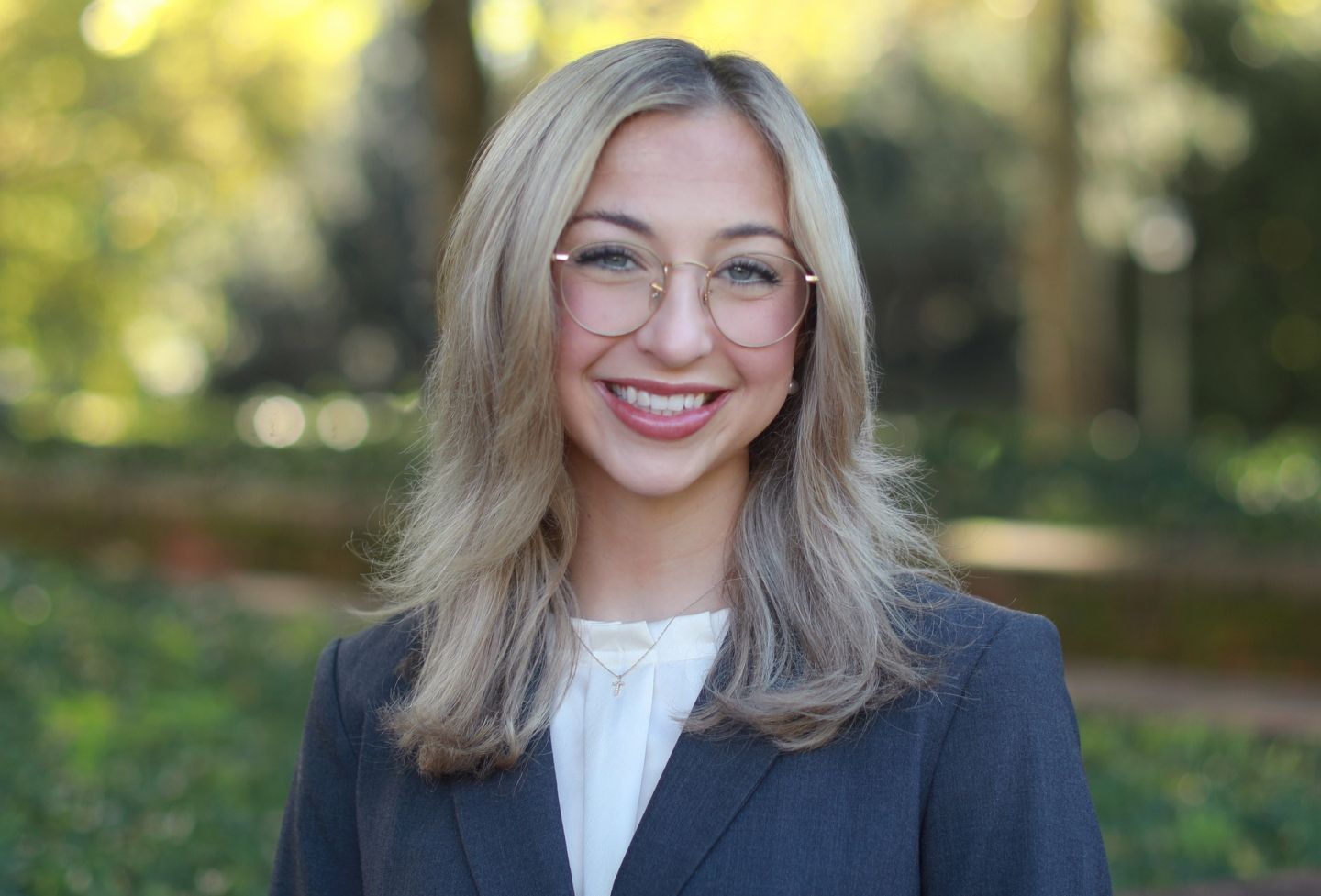When Karl Lockhart ’18 received his “professor review” copy of a corporations textbook this month, cracking the binding on the thick red casebook was a “surreal” moment. The last time he had opened a corporations casebook was as a student, more than five years ago. This time, Lockhart opened it as a soon-to-be rookie professor — he begins teaching Business Organizations at DePaul University College of Law in August.
Lockhart is one of three recent UVA grads who will join U.S. law schools as tenure-track professors this fall, with support from an Academic Placement Committee that aims to position UVA alumni to compete in the academic marketplace — from their initial applications on through to their in-person interviews. This year, U.S. law schools hired 119 entry-level professors, according to data from the Association of American Law Schools, and UVA Law tied for fifth in the number of graduates joining faculties.

“It’s sort of an opaque process once you start applying to these schools — you don’t really know what questions they’re going to ask and what you need to say in response,” Lockhart said. “Sometimes they’ll ask you one question but they’re really asking you something else, and you need to know how to work in the information they’re looking for.”
While the committee can help a UVA alumnus ace the interview, getting to that point is another story altogether, seemingly requiring a carefully manicured law school record and planning of one’s career moves. That playbook can also be shrouded in mystery for first-generation law students, such as Chinmayi “Chinny” Sharma ’19 and Adam Crews ’15, who are joining the law faculties of Fordham and Rutgers, respectively.
“The lack of visibility into the academic path means people opt out — I opted out — I didn’t think I had a prayer of getting into academia,” Sharma said. “I loved reading and discussing papers, and writing them, so I think a lot of my professors were like, ‘It kind of seems like you’d really like academia.’ But I wasn’t Order of the Coif [top 10%], I didn’t have an appellate clerkship and I did not spend all of law school writing articles. So I just didn’t think I had the prestige prerequisites.”
Turns out, Sharma was wrong.

Of the 119 new U.S. law professors, more had a fellowship (71%) than a clerkship (48%). Nearly 60% had a higher degree. Four of the newest professors had none of those credentials.
“Somehow I stumbled into it, largely because mentors and professors like [Professor] Danielle Citron advocated so strongly for me in my career,” Sharma said of the LawTech Center director who helped her land the mid-career fellowship that would set her on her path to “Professor Sharma.”
While in law school, Sharma, a former computer programmer, co-founded LIST — the Law, Innovation, Security & Technology student group — to focus on the novel legal, policy and business problems of emerging technologies. She “did the thing with” Law Review, and also published an article in the Memphis Law Review after graduation, which checked off two of the “prestige prerequisites.” She was also a summer associate at Hogan Lovells and later clerked for a federal judge in the Western District of Virginia to “keep doors open.”
After her clerkship, she opted to join a boutique tech law firm in Washington, D.C. — Harris Wiltshire & Grannis — because of its smaller size and tech focus. While at HWG, she continued writing about cybersecurity for the Lawfare blog but didn’t write law review articles.
In contrast, Lockhart, who graduated the year before Sharma, “got hooked on this idea that you can just research stuff and write about it to try to say something new.”
During a first-year summer internship at the World Bank’s International Finance Corporation in Johannesburg, Lockhart encountered some interesting legal questions. He asked now-Vice Dean Michael Gilbert to supervise an independent study on those topics. Gilbert provided “invaluable feedback,” Lockhart said, as he turned his research into an article that he eventually published in the Boston College Law Review and presented at two conferences.
Lockhart published two more student notes, one in the Georgetown Journal of International Law and one in the Virginia Law Review (he earned his membership by writing the note), and he was also published in the Virginia Policy Review.
When one of his student notes, about whether certain Securities and Exchange Commission regulations violate the First Amendment rights of corporate shareholders, was cited by the Alaska Supreme Court, Lockhart saw a first glimmer of hope that becoming a law professor might be possible.
“When that happened, I think that was a good sign for me that this was something that I could do,” Lockhart said. “Someone read this stuff and didn’t think it was too crazy or too terribly written not to publish it, and a judge actually read this and it may have affected their thinking when they were deciding a legal case.”
He went on to clerk for the U.S. Court of Appeals for the Fifth Circuit and did two stints as an associate at Hogan Lovells. Throughout it all, he continued writing and publishing. “It was a little tough balancing writing and being an associate, but it happened right when COVID-19 hit, so I ended up having a little bit of a slowdown in my practice group and had time to write on the side,” Lockhart said.
Adam Crews, who graduated three years before Lockhart, followed a similar path to academia as Lockhart, serving on the Law Review, lining up an appellate clerkship, joining a major law firm and writing nonstop.
In Crews’ case, however, most of the writing started after he left Covington & Burling to join the Federal Communications Commission just as the pandemic slowed the roll of social and professional lives.
“It put me in a position to dig into really interesting legal issues in a way that just wasn't feasible in private practice,” Crews said. “And because the world was shut down, it gave me a lot of free time to pursue the things I was learning while doing my deep dives into administrative law and to start writing law review articles.”
Sharma also became prolific once she left private practice to take on a yearlong fellowship at the University of Texas School of Law, where she became a scholar in residence and a lecturer on internet law and computer crime.
A chain of events led to this breakout opportunity: She saw the fellowship posted on Lawfare; Merritt Baer, a mentor she had met by “cold-emailing” her, also saw the listing and recommended Sharma to the school; and another UVA alum, John Woods, introduced Sharma to Citron, who ultimately prodded the UT dean — one of Citron’s co-authors — on Sharma’s behalf.
“It is just building that community of people who can advocate for you — these are the three people that helped me get to UT,” Sharma said. “And the dean, Bobby Chesney, was not someone who was beholden to the historical markers of prestige and gold stars, so when I interviewed, I think they liked me and liked my energy and took a chance on me.”
Because of her position, publications and subject-matter expertise at UT, a couple of law schools reached out to recruit her to apply for permanent full-time associate professorships. Another mentor, former UVA Law professor Kimberly Kessler Ferzan, recommended that she leverage that interest to approach schools that would best meet her own needs and criteria. Ultimately, that ended up being Fordham University School of Law — Citron’s alma mater.
“The lesson I learned from this is just to ask help from anyone you know and accept it from anyone who’s willing to give it,” Sharma said. “And don’t opt yourself out.”
Sharma’s interview process at Fordham was considered “off-cycle,” which means the decision was made outside of the normal yearlong hiring bonanza that is run under the auspices of the American Association of Law Schools’ Faculty Appointments Register, or FAR.
Last August, Lockhart and Crews both approached the academic market by entering their resumes and applications into FAR. The FAR form seeks information that includes the applicants’ education, teaching preferences, publications, research agenda and diversity statement.
If a candidate meets a school’s criteria in the screening interview, they will be brought to campus for a full day of in-person interviews that include an hourlong “job talk.” The job talk is a presentation about one of the candidate’s working papers.
“You go up and talk for 20 minutes about your project, and then field questions for 40 or so minutes from the faculty and engage in a back and forth where they’re sort of testing how you are on your feet, how you are going to be in the classroom, how you think, how you engage with ideas and how you would be as part of that scholarly community,” Crews said. “Most schools I met with also had a student panel to talk about whatever issues are on the students’ minds,” including cold-call and exam philosophies, teaching style and the concerns of first-generation law students.
Crews was able to nail his Rutgers interview, in part, by discussing his personal history as a first-generation student from Missouri — but also by promising to make Civil Procedure engaging by working in references to Taylor Swift’s copyright litigation. (And yes, he scored tickets to her concert.)
Lockhart said he went through about 20 screening interviews over Zoom and had three in-person callbacks. DePaul, where he will teach Business Organizations and Securities Regulation, was his top choice.
Lockhart praised the Academic Placement Committee, led by Professor Richard Re this year.
“He was in touch with me pretty much every step of the way,” Lockhart said. “And they also mooted me to prepare me for my job talk, which was really helpful. They’re busy and yet they took time to actually read my paper before the moot.”
Now that their credentials have been cleared, their papers have been published and their job talks have been presented, the real work begins. Lockhart said, for instance, that he’s been advised by one of his mentors, Professor Charles Barzun ’05, to read that thick casebook in full ahead of time — and then the particular section for class again the night before teaching it.
“I think the first year is going to be pretty tough because I’ve never taught a class before,” Lockhart said. “I’m talking with current law professors — and professors in general — to hear how they prepare for class, because it’s good to get different perspectives and hear what people are doing in other disciplines. Because I don’t think law has a monopoly on how best to teach.”
Re and the committee are excited for the next batch of alumni who may dip their toes into the academic market.
“Landing a law teaching job can seem like a mysterious or daunting process,” Re said, “but the academic placement committee is ready to answer questions and prepare our students to succeed.”
Founded in 1819, the University of Virginia School of Law is the second-oldest continuously operating law school in the nation. Consistently ranked among the top law schools, Virginia is a world-renowned training ground for distinguished lawyers and public servants, instilling in them a commitment to leadership, integrity and community service.


